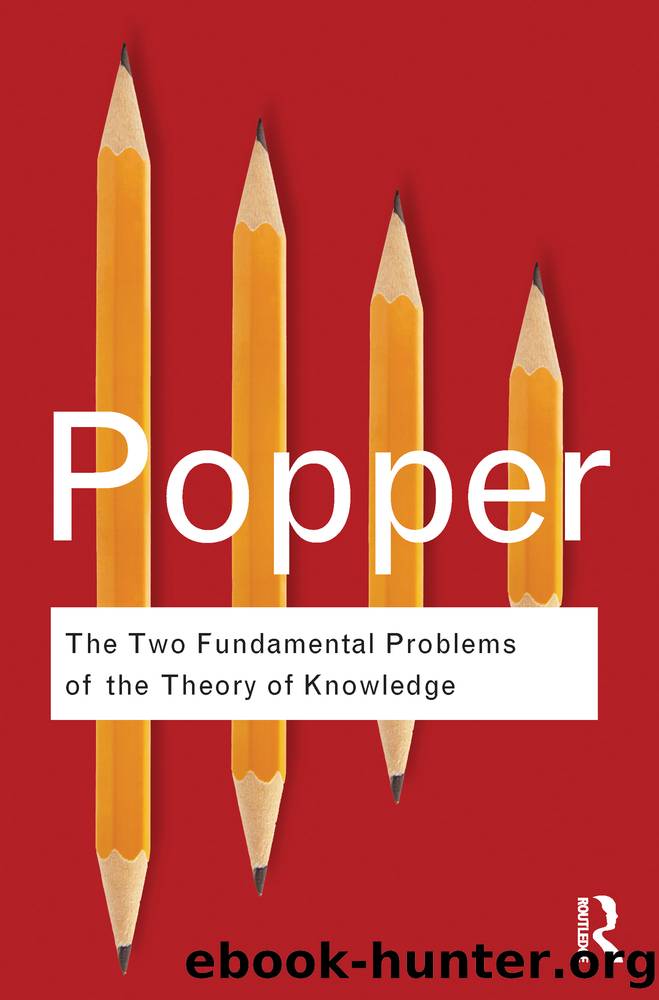The Two Fundamental Problems of the Theory of Knowledge by Unknown

Author:Unknown
Language: eng
Format: epub
ISBN: 9781135626839
Publisher: Taylor & Francis (Unlimited)
Published: 2023-04-15T00:00:00+00:00
Chapter IX
STRICTLY UNIVERSAL STATEMENTS AND SINGULAR STATEMENTS
DOI: 10.4324/9780203371107-10
31. Implication and general implication
Our critical discussion of the pseudo-statement positions was interrupted in order to enable us to analyse (in sections 24â30) the set of problems posed by conventionalism, above all in order to allow a closer characterisation of the first pseudo-statement position.
On that occasion, logical (logistical) questions were discussed in perhaps greater detail than was absolutely necessary. This was done in part because a polemical treatment was desirable, but also because the terminological machinery acquired in that process will be needed in a further discussion, which is also polemical. Only after concluding this discussion can we return to the critique of the pseudo-statement positions.
This second polemic concerns the relationship between general implications on the one hand and universal and singular statements on the other.
The problem at the centre of this debate will be examined in the next section; the present section has the task of providing a recapitulation of the concept of general implication.
For this purpose, we discuss first the logistical concept of âimplicationâ and then the concept of âgeneral implicationâ. For a more detailed discussion of the latter, the concept of âimplicationâ is almost indispensable.
The concept of âimplicationâ is, however, important for other reasons too. Its examination will shed considerable light on certain aspects of the problem of induction itself. This important additional result will be used in the subsequent analysis â though it should be clearly understood that the analysis has, at the present stage, different objectives.
While a âgeneral implicationâ asserts that a particular relationship holds between propositional functions, an âimplicationâ asserts that a similar relationship holds between genuine statements. (The âimplicansâ and the âimplicateâ of an âimplicationâ are thus statements and not statement functions.) Both âgeneral implicationsâ and âimplicationsâ are assertions; they are themselves genuine statements. An âimplicationâ might, therefore, also be called a âstatement about statementsâ, and a âgeneral implicationâ a âstatement about propositional functionsâ.*1
*1 These formulations (in particular the word âaboutâ) again demonstrate the absence of a distinction between object language and metalanguage. What is meant is that an implication is a statement containing (two) statements, while a general implication is a statement containing statement functions.
An âimplicationâ connects statements (its implicans and its implicate), thus forming a conditional proposition (âhypothetical judgementâ). The latter is usually expressed linguistically by means of the connective âif ⦠then â¦â (âIfâ introduces the implicans, âthenâ the implicate.) For example, âIf Napoleon carries a sword, then he also wears a hat.â
This example was intentionally chosen so that no âinternalâ dependence whatever exists between the two interconnected statements involved (âNapoleon carries a swordâ, âNapoleon wears a hatâ). An âimplicationâ should not be regarded as an assertion about the internal relations, or about the content of the two statements; it asserts only a relationship between their truth values.
What it asserts is only that if the implicans is true, then the implicate is also true.
Therefore, it asserts nothing about the content of the statements, nor does it say that âsomething is the caseâ, that
Download
This site does not store any files on its server. We only index and link to content provided by other sites. Please contact the content providers to delete copyright contents if any and email us, we'll remove relevant links or contents immediately.
The remains of the day by Kazuo Ishiguro(9001)
Tools of Titans by Timothy Ferriss(8400)
Giovanni's Room by James Baldwin(7348)
The Black Swan by Nassim Nicholas Taleb(7134)
Inner Engineering: A Yogi's Guide to Joy by Sadhguru(6797)
The Way of Zen by Alan W. Watts(6617)
The Power of Now: A Guide to Spiritual Enlightenment by Eckhart Tolle(5786)
Asking the Right Questions: A Guide to Critical Thinking by M. Neil Browne & Stuart M. Keeley(5778)
The Six Wives Of Henry VIII (WOMEN IN HISTORY) by Fraser Antonia(5516)
Astrophysics for People in a Hurry by Neil DeGrasse Tyson(5191)
Housekeeping by Marilynne Robinson(4452)
12 Rules for Life by Jordan B. Peterson(4307)
Double Down (Diary of a Wimpy Kid Book 11) by Jeff Kinney(4275)
Ikigai by Héctor García & Francesc Miralles(4275)
The Ethical Slut by Janet W. Hardy(4260)
Skin in the Game by Nassim Nicholas Taleb(4252)
The Art of Happiness by The Dalai Lama(4131)
Skin in the Game: Hidden Asymmetries in Daily Life by Nassim Nicholas Taleb(4009)
Walking by Henry David Thoreau(3965)
